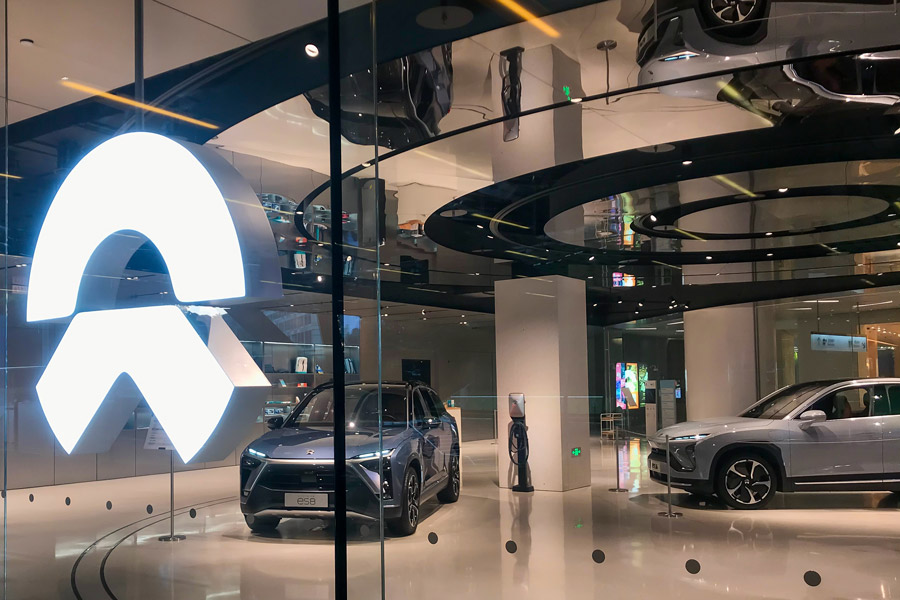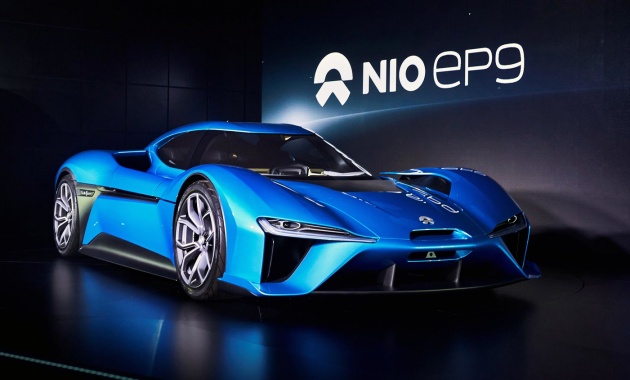
Last week, Nvidia disclosed that the US will require the chipmaker to get a license for future export to China for certain products, in an effort to reduce the risk they are used by the Chinese military. However, according to the founder, chairman and CEO of NIO, this will not have an impact on their business operations. Based on their estimation, their computing power is sufficient for their autonomous driving technology development in the aspect of the AI training for now.
FYI, NIO reports a wider second-quarter loss despite the increase in EV shipment. Does this company have the potential to grow? What make many analysts like this company? Let us look into it together.
Background
NIO is a Chinese multinational automobile manufacturer headquartered in Shanghai, specializing in designing and developing electric vehicles. The group is founded in Nov 2014 and it is known for its development of battery-swapping stations for its vehicles as an alternative to conventional charging stations.
NIO Inc. is primary listed on the NYSE since 12 September 2018 (NYSE: NIO), secondary listed by way of introduction on the Main Board of Hong Kong Stock Exchange on 10 March 2022 (HKSE:9866), secondary listed by way of introduction on the Main Board of Singapore Exchange on 20 May 2022 (SGX: NIO).
NIO has its own research and development, manufacturing facilities located in Shanghai, China. The group’s operations are spread across the US, the UK, Hong Kong, and China.
Business Model
NIO designs, develops, jointly manufactures and sells premium smart electric vehicles, driving innovations in next-generation technologies in autonomous driving, digital technologies, electric powertrains and batteries. NIO differentiates itself through its continuous technological breakthroughs and innovations, such as its industry-leading battery swapping technologies, Battery as a Service, or BaaS, as well as its proprietary autonomous driving technologies and Autonomous Driving as a Service, or ADaaS.
NIO introduced the EP9 supercar in 2016. In December 2017, it launched the ES8, which is a 6- or 7-seater flagship premium smart electric SUV. Subsequently, it launched the award-winning ES6, a 5-seater high-performance premium smart electric SUV in December 2018, and the EC6, a 5-seater premium smart electric coupe SUV in December 2019, followed by the ET7, a flagship premium smart electric sedan in January 2021. In December 2021, it launched the ET5, a mid-size premium smart electric sedan. In 2021, the NIO ES6, EC6 and ES8 were the top, second and fourth best-selling premium battery electric SUVs as measured by sales volume in China respectively, according to Frost & Sullivan.
Management Background

Mr. Bin Li (李斌) is NIO’s founder and has served as chairman of the board since its inception and as a chief executive officer since March 2018. In 2000, Mr. Li co-founded Beijing Bitauto E-Commerce Co., Ltd. and served as its director and president until 2006. From 2010 to 2020, Mr. Li served as chairman of the board of directors at Bitauto Holdings Limited (previously listed on NYSE with stock code BITA), a former NYSE-listed automobile service company and a leading automobile service provider in China. In 2002, Mr. Li co-founded Beijing Creative & Interactive Digital Technology Co., Ltd. as the chairman of the board of directors and had served as its president and director. Mr. Li received his bachelor’s degree in sociology from Peking University.
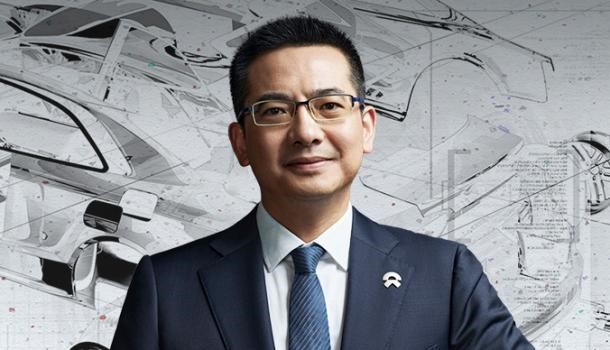
Mr. Lihong Qin (秦力洪) is NIO’s co-founder and has served as the group’s director and president since its inception. Prior to join NIO, Mr. Qin served as chief marketing officer and executive director at Longfor Properties Co., Ltd. (HKEX: 960), a leading company involved in property development and investment in China, from 2008 to 2014. He also served as deputy general manager at Anhui Chery Automobile Sales and Service Company from 2005 to 2008, as senior consultant and project manager at Roland Berger Strategy Consultants from 2003 to 2005. Mr. Qin received his bachelor’s degree and a master’s degree in law from Peking University in 1996 and 1999, respectively, and a master’s degree in public policy from Harvard University in 2001.
Financial Highlights for the Second Quarter of 2022
NIO delivered 25,059 vehicles in the 2Q2022, including 3,681 ES8s, 9,914 ES6s, 4,715 EC6s and 6,749 ET7s, representing an increase of 14.4% from the 2Q2021 and a decrease of 2.8% from the 1Q2022.
Vehicle sales were RMB9,570.8mil (US$1,428.9mil) in the 2Q2022, representing an increase of 21% from the 2Q2021 and an increase of 3.5% from the 1Q2022. Vehicle margin was 16.7% in the 2Q2022, compared with 20.3% in the 2Q2021 and 18.1% in the 1Q2022.
The group’s total revenues were RMB10,292.4mil (US$1,536.6mil) in 2Q2022, representing an increase of 21.8% from the 2Q2021 and an increase of 3.9% from the 1Q2022. The group’s gross profit was RMB1,340.3mil (US$200.1mil) in the 1Q2022, representing a decrease of 14.8% from the 2Q2021 and a decrease of 7.4% from the 1Q2022.
Gross profit was RMB1,340.3 million (US$200.1 million) in the second quarter of 2022, representing a decrease of 14.8% from the second quarter of 2021 and a decrease of 7.4% from the first quarter of 2022. Gross margin was 13.0% in the second quarter of 2022, compared with 18.6% in the second quarter of 2021 and 14.6% in the first quarter of 2022.
Loss from operations was RMB2,845.6 million (US$424.8 million) in the second quarter of 2022, representing an increase of 272.8% from the second quarter of 2021 and an increase of 30.0% from the first quarter of 2022. Excluding share-based compensation expenses, adjusted loss from operations (non-GAAP) was RMB2,355.1 million (US$351.6 million) in the second quarter of 2022, representing an increase of 360.1% from the second quarter of 2021 and an increase of 37.3% from the first quarter of 2022。
Net loss was RMB2,757.5 million (US$411.7 million) in the second quarter of 2022, representing an increase of 369.6% from the second quarter of 2021 and an increase of 54.7% from the first quarter of 2022. Excluding share-based compensation expenses, adjusted net loss (non-GAAP) was RMB2,267.0 million (US$338.5 million) in the second quarter of 2022, representing an increase of 575.1% from the second quarter of 2021 and an increase of 73.1% from the first quarter of 2022。
Net loss attributable to NIO’s ordinary shareholders was RMB2,745.0 million (US$409.8 million) in the second quarter of 2022, representing an increase of 316.4% from the second quarter of 2021 and an increase of 50.4% from the first quarter of 2022. Excluding share-based compensation expenses and accretion on redeemable non-controlling interests to redemption value, adjusted net loss attributable to NIO’s ordinary shareholders (non-GAAP) was RMB2,185.6 million (US$326.3 million) in the second quarter of 2022, representing an increase of 551.1% from the second quarter of 2021 and an increase of 70.1% from the first quarter of 2022.
Cash and cash equivalents, restricted cash and short-term investment were RMB54.4 billion (US$8.1 billion) as of June 30, 2022.
Future Prospect
The 2H2022 is a critical period for NIO to scale up the production and delivery of multiple new products. The ES7, the group’s first mid-large five-seater smart electric SUV based on NIO Technology 2.0 (NT2.0), has become a new favorite of the market with its superior performance, comfort and digital experience. The group witnessed a robust order inflow for the ES7 and started its deliveries at scale in August 2022.
NIO also looks forward to starting the mass production and delivery of the ET5 in late Sep 2022. With the compelling product portfolio and well-established brand awareness, NIO will attract a broader user base and embrace robust growth in the coming quarters.
To meet the growing EV demand of the global market, the group has been working closely with their partners to ramp up the production and deliveries of their new products. NIO also expects to further expand its market share in the global premium smart electric vehicle market with high operating efficiency.
Technical Analysis
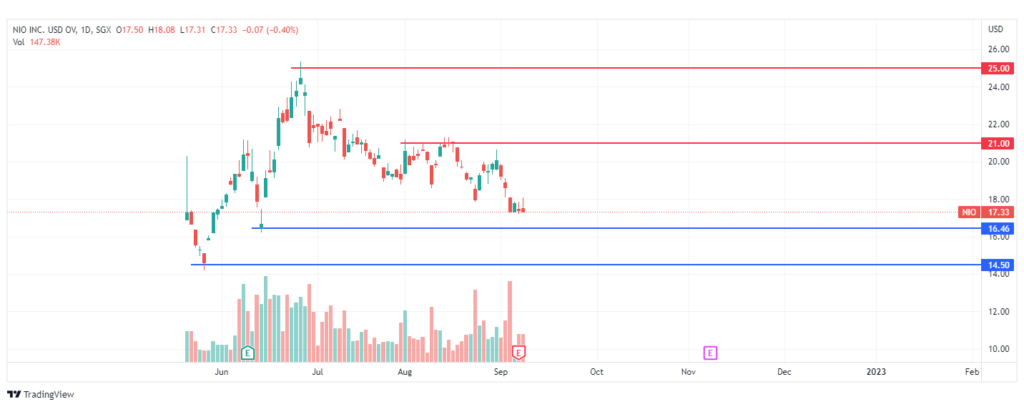
Resistance Level: USD25, USD21
Support Level: USD16.45, USD14.50
Current Share Price: USD17.33
NIO inc. currently is in a downtrend for two months. A breakdown of price level of USD16.15 is a sign of downtrend continuation and might challenge the important support price level of USD14.50.
Aside from EV companies listed in SGX, there are also some electric vehicles related ETFs listed on SGX, such as NikkoAM-StraitsTrading MSCI China Electric Vehicles and Future Mobility ETF (EVS) and Lion-OCBC Sec HSTECH. Let us look into them.
NikkoAM-StraitsTrading MSCI China Electric Vehicles and Future Mobility ETF (EVS)
The NikkoAM-StraitsTrading MSCI China Electric Vehicles and Future Mobility ETF is the first SGX listed ETF to offer investors access to Chinese companies that are expected to derive significant revenues from energy storage technologies (including electric vehicles), autonomous vehicles, shared mobility and new transportation methods. The Fund aims to achieve long term capital growth by replicating the returns of the MSCI China All Shares IMI Future Mobility Top 50 Index.
In Singapore, the government is championing support for EVs as clean-energy vehicle options to reduce emissions as part of Singapore Green Plan 2030.
The sales of EVs have surged in 2021 in China. BYD sold triple the number of EVs, 71,099 in September 2021 compared to 19,881 in 2020 and XPeng reported almost twice the number of EV shipments. According to Fitch Ratings, the proportion of EV sales of total passenger vehicle sales in China rose from 13.2% to 18.6% 2Q21. China is predicted to contribute over 50% of new global EV sales by 2025. Additionally, China has also imposed a mandate on automakers to make EVs account for 40% of all new car sales by 2030.
China dominates the world’s production of lithium-ion battery which is a key component of EV manufacturing. China controls 80% of the global raw material refining, 77% of the global cell capacity and 60% of global component manufacturing, according to BloombergNEF.
These demand and supply factors make China an attractive EV market which is why NikkoAM’s new NikkoAM-StraitsTrading MSCI China EVFM ETF is geographically focused on China.
For Singapore investors looking to capitalise on this growth sector, NikkoAM is introducing an ETF that specifically focuses on the Electric Vehicles and Future Mobility (EVFM) in China.
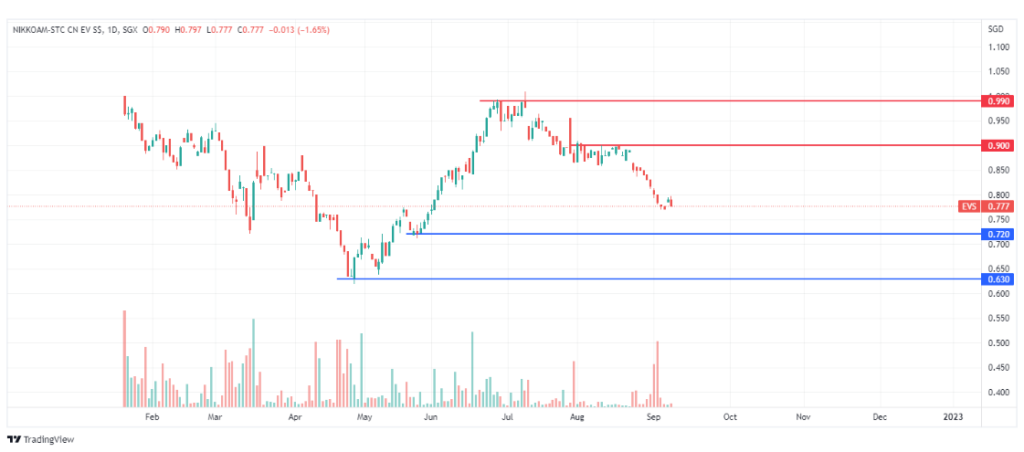
Resistance Level: SGD0.99, SGD0.90
Support Level: SGD0.72, SGD0.63
By comparing EVS ETF and HSTECH ETF, we will notice that both ETFs have a strong positive correlation with each other. This is due to both ETFs are having similar components and sectors of stocks. A rally in price towards SGD0.90 and a test above SGD0.99 is a good sign of trend reversal. Whereas the price level of SGD0.72 and subsequent drops below the SGD0.63 price level indicate that the bearish market will continue.
Lion-OCBC Sec HSTECH
On 10 December 2020, the Lion-OCBC Securities Hang Seng TECH ETF (Stock Code: HST/HSS) was listed on the Singapore Exchange (SGX). As its name suggests, the ETF tracks the Hang Seng TECH Index’s performance, which comprises the 30 largest technology-related companies listed on the Stock Exchange of Hong Kong.
The Lion-OCBC Securities Hang Seng TECH ETF is an index-based ETF. This means it seeks to replicate the performance of the Hang Seng TECH Index it is tracking as closely as possible. As an investor, we should know the underlying companies that form the Hang Seng TECH Index. Ultimately, when we invest in an index-based ETF, we are investing in the underlying companies. For the Hang Seng TECH Index, it is tech-related companies such as Xpeng, Li Auto, BYD, NIO, etc that we will be investing into.
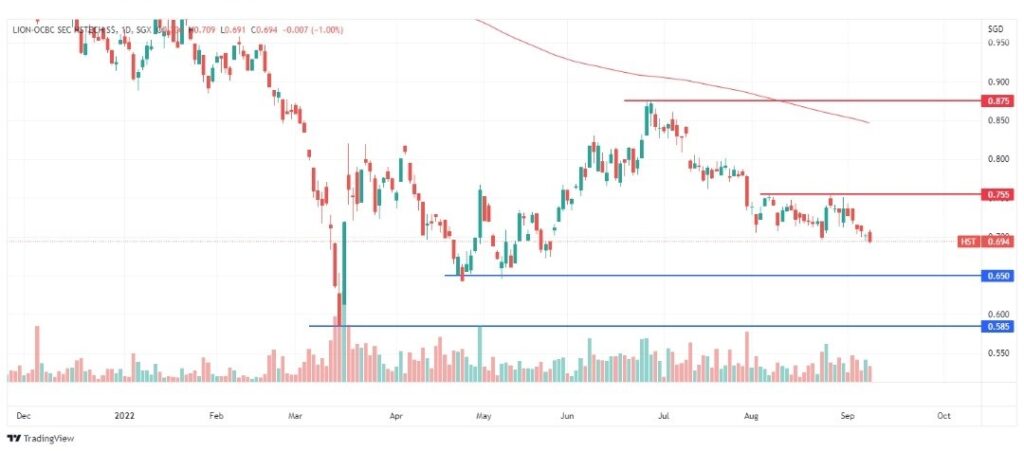
Resistance Level: SGD0.875, SGD0.755
Support Level: SGD0.650, SGD0.585
From the LION-OCBC SEC HSTECH ETF (HST), HST ETF is showing long term downtrend when the price is currently under EMA 200. The next important support level to pay attention to is at SGD0.650, whereas SGD0.755 is a very important resistance to observe. If HST ETF is able to break above SGD0.755 and sustain above SGD0.875, it will be a good indication of a reversal signal for the trend to turn trending.
![]() Please like and follow our FB page to get more updates from us. Thank you.
Please like and follow our FB page to get more updates from us. Thank you. ![]()
![]() 𝐃𝐢𝐬𝐜𝐥𝐚𝐢𝐦𝐞𝐫:
𝐃𝐢𝐬𝐜𝐥𝐚𝐢𝐦𝐞𝐫:
The research, information and opinion expressed in this article / video are purely for information and educational purpose only and should not be construed as investment advice. We will not be liable for any losses or damages suffered from your investment decisions. Kindly consult a licensed investment advisor if you wish to get any investment advice.
![]() Open a Stock / Futures trading account in Malaysia: https://bit.ly/3dX157y
Open a Stock / Futures trading account in Malaysia: https://bit.ly/3dX157y





More articles…
